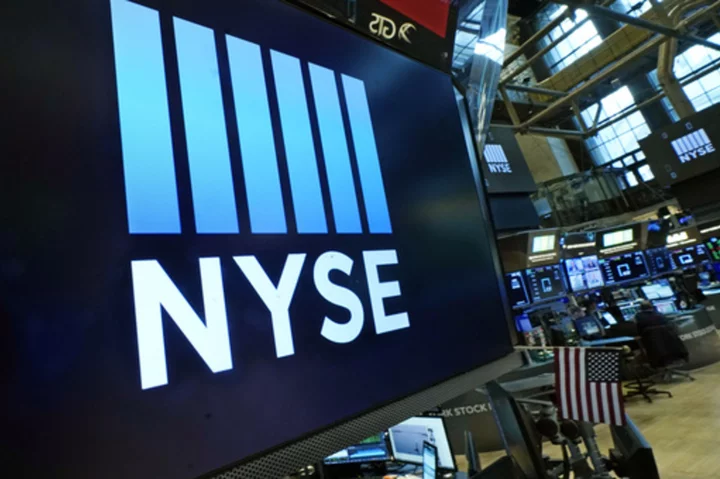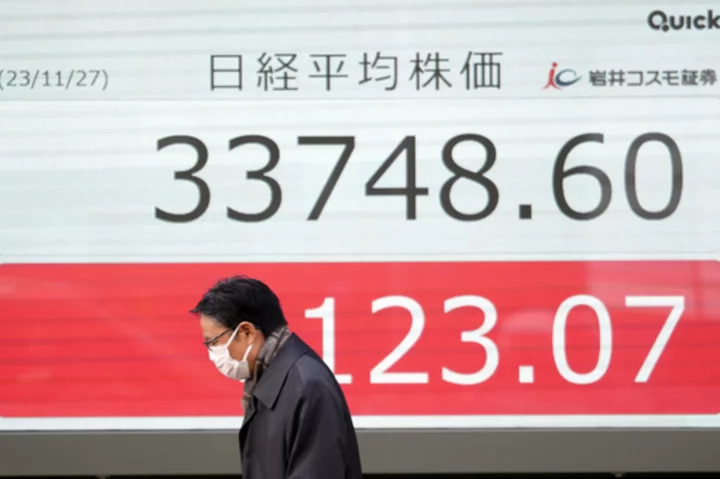NEW YORK (AP) — Stocks are drifting higher Thursday, continuing this week’s lull as Wall Street waits for several big events next week.
The S&P 500 was 0.6% higher in late trading and on track for its biggest move of the week. The Dow Jones Industrial Average was up 185 points, or 0.6%, at 33,850 with less than an hour remaining in trading, while the Nasdaq composite was 0.9% higher.
The market was split between winners and losers, though, after a report showed the highest number of workers applied for unemployment benefits since October 2021. Until now, the job market has remained remarkably solid and helped keep the economy out of a recession.
GameStop was one of the bigger movers, falling 16.8% after ousting its CEO who was brought in to turn around the struggling video game retailer. The company, whose stock became a sensation in 2021 during the meme-stock craze, also reported weaker revenue for the latest quarter than expected.
On the winning side was Carvana. It soared 59.4% after saying it expects to book a record amount of profit on each vehicle sold during the current quarter, among other improving trends.
Adobe rose 4.8% for one of the biggest gains in the S&P 500 after it announced a new artificial-intelligence offering for businesses. A frenzy around AI, bolstered by a monster sales forecast by chip maker Nvidia last month, has helped a select group of stocks to outsized gains this year. It's also raised worries about a possible bubble.
The overall market has been mostly calm after charging higher last week on data suggesting a long-feared recession may not be so imminent. The S&P 500 has climbed close to the edge of a bull market, rising nearly 20% above where it was in mid-October.
But Wall Street’s worries aren’t over yet. The question is still whether a recession will hit before inflation falls enough to get the Federal Reserve to begin cutting interest rates. The Fed has already hiked short-term rates to their highest level since 2007 in hopes of driving down the worst inflation in generations.
High rates do that by slowing the entire economy and dragging on prices for stocks and other investments. The Fed’s sharp hikes have already helped cause several high-profile U.S. bank failures, as well as months of contraction for the manufacturing industry.
That’s why Wall Street’s focus is on next week. That’s when the U.S. government will provide the latest monthly updates on inflation and the Fed will announce its latest move on interest rates.
“Inflation remains the name of the game,” said Mike Loewengart, head of model portfolio construction at Morgan Stanley Global Investment Office.
The expectation among traders is that the Fed will make no move on Thursday, which would be the first meeting where it hasn’t hiked rates in more than a year. Even though inflation remains well above the Fed's comfort level, a pause would give the central bank more time to see how its fusillade of hikes has affected the economy. But traders see the Fed hiking rates again in July.
Thursday's jobless claims report helped firm expectations that the Fed will not raise rates next week. It showed that more workers filed for unemployment benefits last week than expected.
The job market has remained remarkably resilient in the face of higher interest rates, and weakness there could quickly get the Fed to take it easier on rates. Thursday's data helped push against pressure that may have built for tougher policy after central banks in Canada and Australia hiked their own rates recently.
Economists warn the weekly data for jobless claims is prone to sharp shifts, and “we would caution against overemphasizing one week’s data,” said Rubeela Farooqi, chief US Economist at High Frequency Economics.
After the unemployment data hit the market, Treasury yields gave up gains from earlier in the morning. The yield on the 10-year Treasury fell to 3.71% from 3.78% late Wednesday. It helps set rates for mortgages and other important loans.
The two-year yield, which moves more on expectations for the Fed, fell to 4.53% from 4.55%.
Lower rates help all kinds of investments, but investors believe they give the biggest boosts to tech and other high-growth stocks. That's why the S&P 500 and other indexes were able to rise even though the majority of stocks fell.
Apple rose 1.1%, and Microsoft gained 0.7%. Because they're the most valuable companies on Wall Street, their movements carry more weight on the S&P 500 than any other stocks.
In Europe, stock indexes moved modestly after revised figures released Thursday showed the European economy contracted slightly at the end of last year and beginning of 2023.
That means the eurozone shrank for two straight quarters, which is what some call a “technical” recession.
In Asia, Japan’s benchmark Nikkei 225 sank 0.9% after the Japanese government revised its estimate for growth in the January-March quarter sharply higher, to 2.7%. That was above what analysts had expected and raises questions about whether Japan's central bank will keep its easy policies on interest rates.
——
AP Business Writers Yuri Kageyama and Matt Ott contributed.









